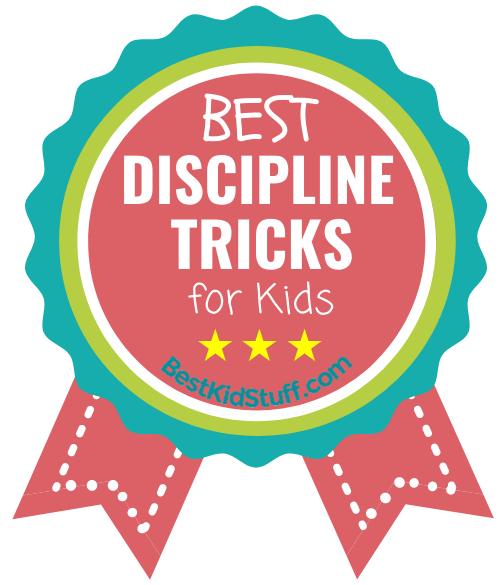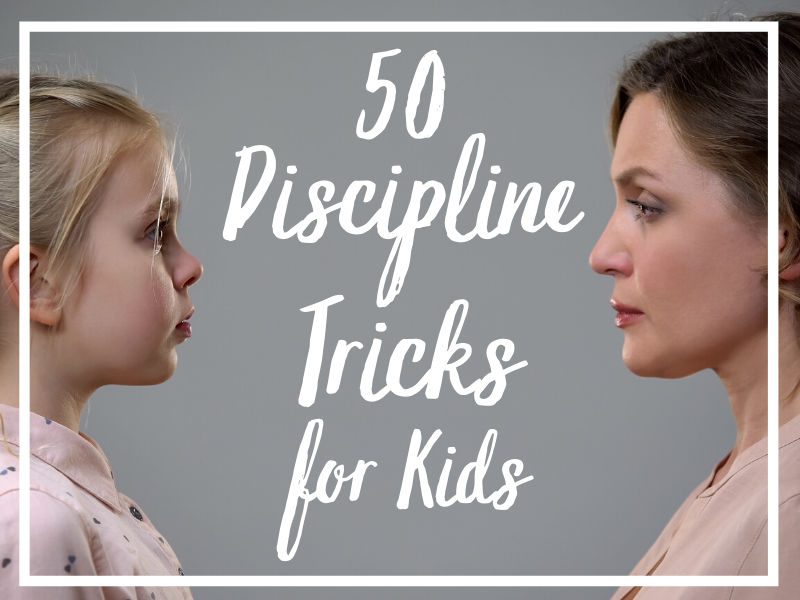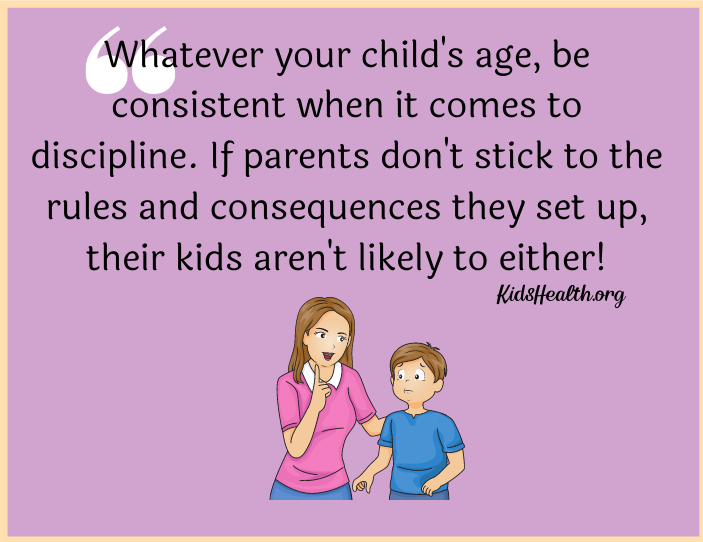“Spare the rod and spoil the child.”

This adage takes on a different meaning, especially today. The traditional child-rearing and discipline practices of the past are now coming into question. What was previously practiced before is now carefully being analyzed.
Although it may be appropriate, those practices are integrated into family life in the most conscientious and selective manner, with the emergence of child psychology and parenting practices that are rooted in developmental science and direct observation.
It would be great to get in on this trend; after all, we only want what’s best for our kids. We’ve compiled a list of 50 tried-and-tested discipline tricks that will help you navigate the world of parenting.
Of course, it means winging it 90 percent of the time, but let this guide make things a bit easier for you. Let’s go!

1. Come from a place of empathy and logic.
When our children make mistakes, we must turn inwards for a bit before we hand them the all-important details about what they should have done in the first place. A 2016 study shows that having an accurate type of empathy (or being able to read into people’s emotions) has something to do with high levels of logic. You must show empathy to your child, at the same time, try to balance being stern and logical in showing them the ropes of life, where accountability is an important thing.
2. Understand the reasoning behind the child’s behavior.
In line with the whole empathy and logical reasoning approach, it’s essential to study our kids’ behavioral patterns, taking note of any quirks or responses, especially under stress (throwing tantrums, kicking, shouting). Are they also adjusting to significant milestones in their lives, such as moving into a new home, or transferring to a new school? Are they getting bullied by their classmates, or is anything else bothering them? Keep an open mind and listening ear when dealing with your child’s behavior – it may mean something more than you think.
3. Act like a parent, not just a buddy.
Especially for first-time parents, disciplining and raising your kids into decent people may seem difficult. A lot of parents think that they shouldn’t act like parents. Instead, they want to be seen as a non-threatening entity in their children’s lives, which could do more harm than good. Kids need an authority figure in their lives, someone they could rely on for checks and balances as they grow. To be a parent, you need to play the part and set some boundaries in your relationship.
4. Please, don’t spoil your children.
This rule is still in line with the parent-child dynamic that often gets blurred when parents are afraid of resentment and ill-feelings when they start disciplining their children. A simple rule of thumb – please don’t spoil your children. It’s okay to show your love and affection through exceptional experiences and material things, but know when to draw the line. Sometimes, you must say “no” to your kids! You don’t have to give them all of their wants in a jiffy. Saying ‘no’ will keep them grounded and will keep their expectations reasonable.
5. Allow them to contribute to any house rules that you may already have.
Yes, we’re talking about letting your children create some rules that make sense in the home! If you’re bent on keeping the peace at home, it’s best to involve your kids in the decision-making process, because this will boost compliance to a whole other level. Simple rules like determining mealtime and bedtime rituals, as well as rewards and punishment systems, make kids feel that they are valued and that their decisions and opinions matter to you.
6. Visual cues are everything.
Additionally, if you want to make your rules and regulations clear to everyone, you can opt to put up visual cues in strategic areas of your home. It would make reminders easier for you and would boost follow-through. For example, if you have a strict ‘no shoes inside the home’ policy, put up a sign that could guide your kids where to put their shoes. Teach your kids about cleaning up after they eat by putting up a visually appealing “clean as you go” sign to remind them of this.
7. Remind them of any expectations that you may have, especially in public settings.
Constant reminders and explaining any expectations that you may have of your child’s behavior are usually useful when you need to be out in public settings, or are exposing your child to a different environment. It helps to be patient with them and explain any unfamiliar situation beforehand so that they would know how to act in a socially appropriate manner. You can let them know ahead of time what is expected of them (i.e., that they shouldn’t run around in Church or that they need to calm down and behave in a social function).
8. Keep the house clutter-free, with adequate kid-friendly spaces.
Yes, this discipline trick may seem like words taken out of a self-help book (Marie Kondo, anyone?), but keeping your house organized and clutter-free is a surefire way to keep your children comfortable and safe, above everything else. Cleanliness and organization are essential life skills that children should learn about early on. That means if they’re thriving in a neat and hygienic environment, it will be second nature to them to keep it that way. Additionally, you can assign easy-to-do chores to help keep your home healthy and happy.
9. Understand that things change once you become a parent.
Gone are the breezy, hassle-free days of our youth – the reality of becoming a parent rarely kicks in immediately, and it may take a bit of time before you truly accept that you’re entering the different territory. It involves a lot of effort and sacrifices on your part, but it’s genuinely worth it seeing your kids grow up to their fullest potential, under your guidance and love. It will change your routine for good and change up all of your priorities in a drastic way. Nonetheless, it’s best to look inward at first and take some time to set your mind, preparing yourself for the long haul.
10. Give them a voice.
As parents, we give our children a “voice” or a sense of agency that helps us feel that whatever we say or do can impact the world, making us more confident with ourselves and our abilities. We must value the opinions of our children as we would our views (or the opinions of our peers). It pays to integrate ourselves into their world, engaging in different activities such as playtime and discussing important issues and concerns. Additionally, learning is a two-way street – we could learn a thing or two from our kids.
11. ..but turn down the volume if necessary.
Imagine your kids crying, screaming, kicking, and cranking up the room’s volume. A frustrating part of being a parent. Talking about tantrums may seem like a hot take, but it’s a normal part of child development. Yes, it’s essential to let them be heard, but you can always stick with this proven technique. When your kids start raising their tone and reasoning out disrespectfully, you can always tell them to lower the volume before being allowed to express themselves. That will usually take less than a minute.
12. Silence is your friend.
In any heated discussion, both parties are experiencing a great deal of stress, prompting unhealthy responses and bouts of word vomit, uttering statements that they don’t necessarily mean. Hurtful words, or unbearable loudness, may impact your children in the future. When things go too far, it’s best to stick with silence, and allow both parties to simmer down. Take away their privilege to reason out for a certain amount of time, allowing the kids to step back, calm down, and think about their words and actions.
13. Diffuse the tension with some humor.
You may not have a single funny bone within your body, but with kids, cracking a joke or two becomes one of the most natural things to do. Because kids have a crazy beautiful imagination, you can use this trait to your advantage and use humor and jokes to diffuse any temper tantrum and backtalk situation. Try to rephrase their angry sentiments funnily, or try to include an impromptu rhyme or an inside joke whenever they start getting agitated. This will cause a fit of laughter, and end whatever tension is left.
14. Let the child face the consequences of their actions.
Especially with school-aged children who have a good grasp of consequences, you can let your kids feel being on the receiving end of any adverse action. For example, if they don’t feel like doing their homework, allow them to go to school tomorrow without any schoolwork in hand. Once they realize that they cannot get away with these real-life consequences, it enables them to be more conscious about being more responsible. Just be sure that these are natural consequences and not any made-up consequences that are convenient for you!
15. On the flip side, be conscious about rewarding positive behaviors.
Rewarding positive behaviors doesn’t necessarily mean giving actual gifts every single time your child is awarded any type of achievement. It may come in giving effective praise (that’s specific, unconditional, and encouraging), hugging or giving a high-five. For example, if your kid did well in school, encourage them by focusing on the achievement and avoid mentioning competition or making comparison. Avoid saying, “Can you do better next time?” or “You can beat *classmate in the top spot* in the next semester” because all these discredit their effort.
16. Do now, reason out later.
Obedience is a hard topic to get around, especially with children who are at an age where they are keen on exercising their own independence. Of course, parents can always try and appease angry fits, but this often doesn’t get the job done. Parents can try establishing a “do now, reason out later” rule at home, where kids need to obey first before discussing the “hows” and “whys.” This would ensure compliance on their part and would make any public back-and-forth with your kids a bit easier.
17. Remove shame around making mistakes.
Nobody’s perfect – and we, parents, are especially far from perfect. For the most part, we’re just uttering ‘Hail Marys’ now and then, praying that we’re not screwing things up. As patient as we are with ourselves, we must show the same kind of empathy to our children, who are just as clueless about life as we are. When they make mistakes, we must not concentrate on guilt-tripping and shaming them for not knowing better. Instead, we must foster a culture of accountability and own up to the mistake
18. Be the leader, not the controller.
Human as we are, we, parents, are often called to lead by example and try not to mess up as much because the kids are watching. Of course, it’s easier said than done for the most part. A lot of things make it hard for us to keep our cool, and parenting can be such a frustrating business. It is important to remind ourselves that we need to be a leader for our children and show them how things are done, rather than control them into submission.
19. Act immediately when there’s something fishy.
When your kids do something naughty, it may be tempting just to throw in the towel and throw in a few spankings without explaining why they did something wrong in the first place. Conversely, we may feel that we shouldn’t act right away whenever they do something wrong, which could break any consistency streak that you may have with your kids. Don’t wait a few hours before disciplining your kids right – as soon as you know about the misdemeanor, talk to your kids. Explain that it’s never right to do said action.
20. Pointing out what they did wrong… Showing them how to set things right.
As parents, we may feel a bit exasperated when we see our children getting naughtier by the day. It may be due to them wanting more independence or their highly experimental and curious nature. Again, it’s essential to be cool, calm, and collected when dealing with these mistakes. Instead of the good ole’ talkfest and pointing out every single wrongdoing, it’s important to change up the culture somewhere and, instead, show them how to make things right. It would take away the embarrassment, and they would feel more responsible for their actions.
21. Set clear expectations and boundaries, and be consistent.
Parenting and child-rearing may seem like a chore for the most part. Here we are, enjoying all the good stuff, and all the cute milestones that come with being parents, but when our kids try to act out, we’re left with a puzzle we can’t seem to solve. Consistency is very much an essential step in parenting – rules and boundaries should be clear as day, and you must not change how you respond to any issues over time. This will solidify any reinforcements that you’re trying to build with your children because structure helps them integrate good behavior.
22. A sense of structure is integral to everyday life.
Creating a structured environment in dealing with kids is an essential aspect of parenting that also falls under the consistency clause. Try to create rituals in the child’s routine, like cleaning up after meals (for older children), or setting an exact time where they should go to bed. This also includes setting a designated schedule for leisure activities like using gadgets and other devices or watching their favorite videos on YouTube. Kids need to internalize and repeat these rituals, which foster discipline and productivity as they age.
23. Remind different caregivers about consistent household rules.
Chances are if one or both parents are working, your kids may be left with different caregivers who may have different tips and tricks when it comes to raising children. Some carers may even be a bit more lenient than you, which may raise issues of consistency and confusion for your children. Babysitters, teachers, and grandparents who are involved in your child’s care must know how you deal with your kids at home, helping them adjust accordingly and be more consistent in dealing with children.
24. Simple questions get the job done.
Being a parent may involve a bit of shouting now and then, especially when the kids get a bit crazy with the chores. Instead of shouting out commands or telling them straight-up what they should be doing, you can rephrase it into a simple question and get the job done with much less resistance than usual. For example, after playtime, you can ask your kids something like: “Hey, what do we do after playing again?” as a gentle reminder rather than ask them to stow away all of their toys.
25. Teamwork makes the dream work!
Cliche as it may sound, promoting teamwork and mutually-agreeable solutions in the home, tend to boost obedience and compliance to simple household rules. Even little kids would feel much more appreciated if you take the time to ask them about their routines, or any solutions that could help make everyone’s lives a bit easier. For example, if they would like to have a bit of extra playtime, they must do some chores first before earning it. Now that’s an easy compromise!

26. Focus on controlling yourself—not your child.
As parents, we may feel that it’s difficult to control ourselves – especially in the peak of anger and annoyance. Before we do things that we might end up regretting in the future, it’s best to pace ourselves and control how we react to any stressful or upsetting situation. It’s more than just being the bigger person in the exchange – always remember that the kids are watching us at every turn. They’re taking notes and observing our every move, so be sure to think it through.
27. Catch them in the act…doing great things.
Especially with younger kids, they need to know that they’re doing something right. If they’re mainly doing something good, or have any kind of achievements (big or small), always try to point them out and praise them for their efforts. This applies when they mess up but tried anyway – always acknowledge good behavior. Additionally, if they’ve done an excellent job with house chores, you can be specific, and praise them for the exact task they’ve accomplished.
28. Identify their strengths–and encourage them!
Self-esteem and confidence are substantial aspects of compliance, and if you’d like your child to get more involved in the process, you need to make them feel that they are worthy. Since kids are more receptive to praise than criticism, you can always count on identifying what they do best, and highlight these good traits whenever they feel upset. For instance, if they get a bit impatient and don’t get their way, you can always remind them how behaved they were while they were waiting for their food last week. Always remind them of these good experiences.
29. Throw all of your adverse reactions out of the door!
This bullet is pretty much in line with the “self-control” aspect of parenting. Adverse reactions include dealing with your kids through adult “counter-tantrums,” using sarcasm or ridicule to make your children feel small and worthless in the exchange. It borders on immaturity, and it’s never a good look on any parent. Throw all of these unhealthy responses out of the door – however, annoyed you may feel, you must be careful with your words and be fair and objective with your children.
30. No empty threats, ever!
As parents, it may be tempting to end any misdemeanors with empty threats, or bribes that seem to negate any consistency left in you as a parent. Children are quick when it comes to sensing any patterns, so they know what’s up once you raise your voice and fill the room with any empty threats. It’s only going to blow-up the tension, and it’s not useful in developing discipline and self-reliance. As much as possible, always tell the truth – walk your talk, and lead by example.
31. Be a haven for your kids.
Whatever mistakes that they do, or troubles that they encounter, your kids are your very own. You must let your children know that you love them unconditionally and that you’ll always be there for them no matter what. Show support and acceptance to your kids, letting them know that they’ll always have someone who’ll cheer them on when life gets hard. Be responsive to the needs of your kids, as this would help foster better mental and emotional outcomes and help your kids become well-adapted.
32. Choose your battles, and respond as appropriate.
Choosing your battles is a life skill that you must incorporate into your parenting strategies. Sometimes, your children will act like the children that they are, which means that they will make mistakes here and there. If they aren’t doing anything dangerous or too problematic, it may be best to stay calm and ignore when they’re acting out. This will also teach them a thing or two about natural consequences. For example, if your child throws a temper tantrum and breaks his/her toys, he/she will then realize that he/she won’t be able to play with them.
33. Replace nagging with positive behaviors.
If you’re keen on always saying “no” or “don’t,” chances are you’ll be in for more frustration and stress than you’re prepared for. Kids will usually test your limits and see how far they can go. They are almost always unreceptive to all the nagging and negative reinforcements, so instead of telling them outright what to do, it’s best to offer gentle reminders about positive behaviors. For instance, if they’re acting-up when you’re in a public place, don’t tell them to stop running around – ask them to sing happy songs, or engage in-joke time while waiting in line. This would keep them engaged – no nagging necessary!
34. Reinforce with confidence, and let it resonate.
Especially for new parents who are still figuring out the ins and outs of parenting, it isn’t easy to keep up with all the pressure and demands of everyday life. But life doesn’t prepare you for it – you need to wing it out and go through it like a champ. Reinforce what you know with confidence, and let your children feel that you’ve got it all under control. Children will sense that you know what you’re doing, and this will instill respect and discipline at an early age. Be firm, but gentle, and try to adapt your approach to the situation.
35. Try to let your kids figure out a few things about life.
We, parents, may feel overprotective towards our children – like a mother hen who’s always keeping an eye on her chicks. But we must remember that we simply cannot control everything, or prevent every single heartache and frustration that’ll come their way. It’s best to loosen the leash a bit, and allow your kids to find out solutions to simple problems. Minor frustrations will help your children become more well-adapted and will teach them about resilience and self-reliance.
36. Put the kids to work.
Sometimes, we feel annoyed about our children’s crazy antics. When they spill stuff here or break stuff there, don’t go in on a full-blown nagging session. Instead, try to switch from anger to full-on work mode. For instance, if they spill their food on the floor, don’t get too caught up with the mistake. Involve your kids, let them work, and help clean-up – say something like: “Can you please go get the washcloth so that we can clean up the floor?” This will foster accountability and help retain their self-worth in an uncomfortable situation.
37. Help them figure out the right words to express themselves.
For the most part, children act out the way they do because they simply cannot express themselves adequately. Perhaps they shout, cry, and kick things because they are overwhelmed and frustrated with their environment, or they simply feel left-out and are seeking your attention. Be patient with your kids, and help them express themselves through simple words and sit-down conversations. You can start by asking questions, validating if they feel sad, angry, or just generally feel uncomfortable.
38. Communicate, communicate, communicate the reasons WHY.
Positively disciplining your children would involve lots of effort on your part. As a parent, you must open the channels of communication between you and your kids. Help them figure out why rules and regulations are in place, and why they must stick to them at all times. If your son or daughter cranks-up the mischief, you can’t just say ‘No!’ and call it a day (or worse, pull up the “because I said so” or “because I’m your mom/dad” card). You must be patient with your kids, let them know how they could make up or do things better.
39. And of course, hear them out.
Still exploring the lines of communication, parents must remember that talking with your children is still a two-way street. Listening is crucial to the communication process. Even little kids need to say their peace and express themselves before mommy and daddy come into full-gear and solve the problem head-on. Let them explore their feelings and look into possible patterns of misbehavior (such as jealousy, lack of attention, discomfort). Always be ready with a listening ear, before resorting to punishment.
40. Trust your intuition.
Becoming a mom or dad entails some form of ESP, a gut feel that seems to emerge once your kid is in trouble or in need of your help. It makes sense to be logical about your parenting style; at the same time, it would require a lot of your intuition to make it work. Yes, it’s reasonable to be afraid of making mistakes, that’s why we overdo it in the first place with all the parenting books, podcasts, and tip sheets, but sometimes, you just have to trust that all the answers will come to you – all these internal workings all spring from your love for your child.
41. Teach your child about conflict resolution.
Kids may act up the way they do because of different stressors and frustrations – whether they simply cannot get out of something, or get their way. Early on, it’s essential to teach your kids about conflict resolution, including being receptive to criticisms, understanding that other people have different opinions, and listening to what others have to say (being open-minded). Should any form of conflict arise, kids must know that communication is a crucial tool to reach a solution – no blaming, just cooperating, listening, and compromising.
42. Give them your attention.
Especially for toddlers and preschoolers (even school-aged kids), parents must understand how kids live for mom and dad’s attention. And while work and the household can have so many demands for us, we, parents, must set a few hours in the day to spend some time with our kids. Deliberately working towards forming a bond with our kids will touch their lives in more ways than we could imagine. This is also an excellent example to follow. In turn, they will feel loved and valued and are less likely to get cranky throughout the day.
43. Be prepared for trouble.
Kids will be kids – that’s a reality that we ought to internalize whenever we’re out in public places or any upcoming activities that may overwhelm your kids and bring out their naughty side. As parents, we need to prepare for the worst, like when they act out the grocery and accidentally break something, or when they throw tantrums when you bring them outside. Prepare accordingly – bring their favorite toys along for distraction, and be ready with your clean-up kit if spills and other mishaps happen throughout the day.
44. Additionally, prevention is better than correction.
And while we’re on the subject on preparation, it’s better actually to prevent any untoward event from happening, which may be a product of your child’s impatience or agitation. Make sure that you’re extricating your child from dangerous situations. For example, if you don’t want your child to go anywhere near the pool, install a child-safety gate and additional measures to keep them safe. Their curiosity will almost always get the best of them, so be on the lookout for possible hazards and don’t be content with just telling them off.
45. Try time-outs, with a twist.
Time-outs are a traditional route in terms of parenting, but you can change it up a bit by keeping the area or space you’re planning to keep your child in a bit more conducive for thinking and feeling. Of course, the principles are the same – the main objective is to remove the child from any situation that would cause potential harm or distress to them. Don’t just let the child face the wall, or sit them down at an empty table feeling bad. Instead, designate an area where they can sit down, cool down, and problem solve. A designated quiet nook with comfortable pillows and calming toys usually does the trick.
46. Offer excuses for off-putting behavior.
Yes, putting up excuses for your child’s naughty behavior may go against the parenting grain (and seem a bit complicit), but it can do more good than you realize. Statements that go along the lines of “Maybe you forgot to…,” “I know you didn’t mean it, but…,” or “I think you were trying to” can help diffuse any situation because you don’t have to start with anger to get your point across. Additionally, this would send loving and concerned messages to your children, letting them know that they are inherently good even though they’ve made some mistakes.
47. Tell them how their actions could affect others.
Depending on their age and maturity level, kids usually have a difficult time comprehending the weight of their actions, especially on other people. If they have tantrums here and there, which involve some fights with their siblings and friends, you can sit them down and explain how they could hurt others. For example, you can say, “Hey buddy, when you pinch your friend, his arm hurts a lot,” or “When you tease your sister about her teeth, she will feel hurt about it.”
48. Get the children moving.
Is your child a warm ball of sunshine, who’s always coming in strong with endless bouts of energy for playing and moving? Allow them to be children – let them play around and enjoy! Physical activities and exercises will not only keep them happy and occupied as they should; it will also keep them healthy, active, and secure. WHO recommends around 60 minutes or more of physical activity for children as tolerated. This is an essential facet of growth and development, so be on your toes and keep them running!
49. Teach the kids how to apologize.
When your child hits their sibling or friend or takes away someone else’s toy, what do you do? Contrary to popular belief, it doesn’t end with just forcing a meager ‘sorry’ out of them. How do you generally let your kids feel remorse, and help them realize the gravity of the situation? Sit down with your child and talk a particular situation out, prioritizing the feelings of the other party, and acknowledging the repercussions of their actions. Teaching accountability isn’t easy, and it may take some trial-and-error before they ease into it, but it’s worth doing.
50. Seek help when you need it.
Both new and experienced parents would agree when we say that there’s always something new to be discovered with every milestone that we share with our kids. It’s a never-ending learning experience filled with surprises and challenges, and it can get pretty stressful along the way! Seek help when you need it the most from your parents and in-laws, friends, or even support groups and forums for great parenting tips and tricks that’ll make your life much easier. You’re not alone in this!








